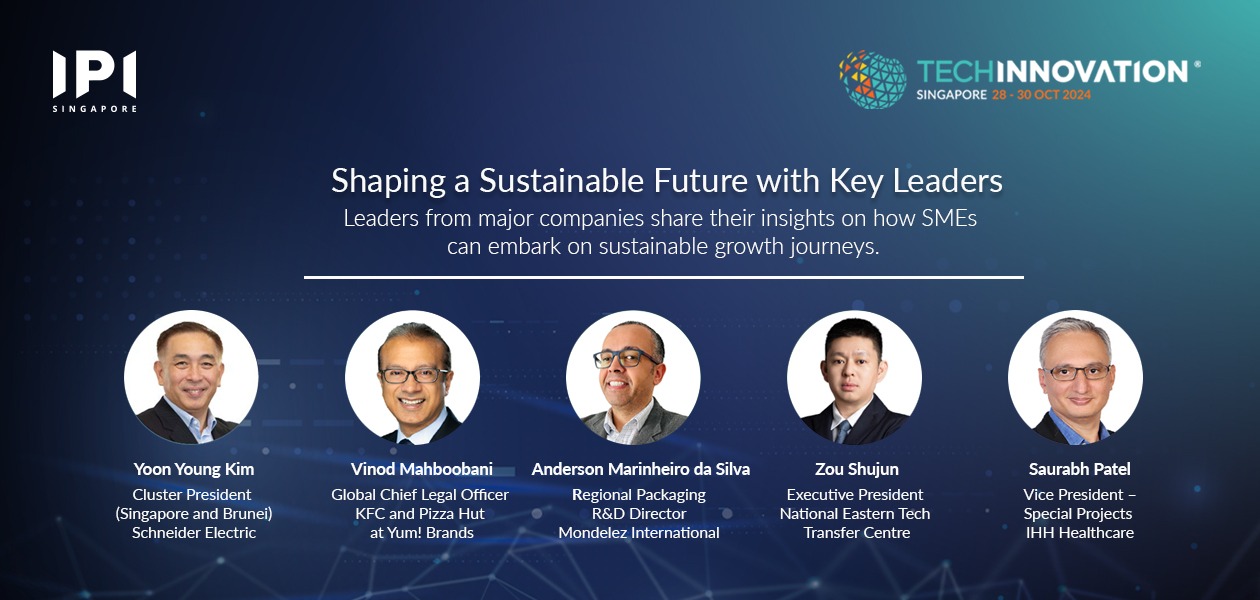Leaders from major companies like Schneider Electric and Mondelez International share their insights on how SMEs can embark on sustainable growth journeys. Find out more from their keynote speeches at TechInnovation 2024.
TechInnovation 2024, IPI’s flagship technology-matching event, is just around the corner. The premier platform will place technology at the forefront—convening industry leaders, entrepreneurial innovators and technology seekers to connect, collaborate and commercialise within the global innovation ecosystem.
This year, TechInnovation centres on Sustainable Urban Living, and will feature a unique blend of content-rich conferences, exhibitions and business networking over three action-packed days. Covering topics from health and wellness to agriculture and food, the event will also feature a thought-provoking line-up of keynote speeches designed to spark new ideas and drive meaningful change.
Day one: Paving the way for future-forward cities
Day one at TechInnovation will explore the pillars of urban sustainability, from renewable energy to green buildings. Attendees will learn about how the cities of tomorrow are being designed and built—with sustainable materials and energy-efficient infrastructure at the fore.
Yoon Young Kim, Cluster President for Singapore and Brunei at Schneider Electric, will deliver a keynote titled ‘Harnessing Innovation for a Sustainable Tomorrow’, sharing Schneider Electric’s role in driving this transformation.
“Navigating the journey to sustainability and digitisation requires collaboration and teamwork. By working together, we can accelerate progress and create a more sustainable future for all,” Yoon said.
Taking charge of sustainability initiatives brings multifaceted benefits to companies and countries in Southeast Asia. “Undertaking sustainability efforts elevates environmental standards, stimulates economic growth and creates jobs,” Yoon added, highlighting how Schneider Electric’s programmes help SMEs navigate decarbonisation and adopt sustainable practices.
In particular, Schneider Electric’s SME Kickstarter Decarbonisation Programme helps small businesses reduce their environmental impact by providing mentorship, financial support and digital solutions. Such sustainability efforts are aligned with the Singapore Plan 2023.
In his keynote titled ‘Innovation and Impact to Company’s Growth’, Vinod Mahboobani, Global Chief Legal Officer of KFC and Pizza Hut at Yum! Brands, will discuss how innovation spurs growth and helps businesses stay ahead of the curve. While smaller businesses may face challenges like funding constraints, maintaining focus and bringing innovations to scale, the right innovation strategy can help them remain competitive.
“Managing cash flow while innovating is critical—do one thing and focus on solving that one problem really well,” he advised. External advisors, he added, can support SMEs by offering industry-specific expertise needed to scale effectively and sustainably.
When it comes to finding the right partners for innovation, the importance of alignment cannot be overlooked. “Seek partners who take time to understand your business and are committed to staying the course, pivoting and solving challenges together,” Mahboobani said.
Day two: Sustaining a future-ready food industry
On day two, participants can expect to gain insights into how the food industry is navigating various sustainability policies and leveraging technology to drive efficiency. Sessions will cover how technology adoption can reduce waste, save resources, create higher-value products, build consumer trust and open new markets.
“It's about making snacks that we believe are not only right for people but also right for the planet—from the raw materials we rely on to the communities we live in and work with,” said Anderson Marinheiro da Silva, Regional Packaging R&D Director at Mondelez International.
In his keynote titled ‘Importance of Sustainability in the Food Industry’, Anderson will outline Mondelez’s sustainability goals, which include reducing virgin plastic and increasing recyclable packaging—all guided by their ‘Snacking Made Right’ framework that aims to shape the future of snacking responsibly.
“Our latest ‘State of Snacking’ report shows that consumers prioritise brands that align with their values—67% in Asia Pacific are even willing to pay more for snacks that are better for the environment,” Silva shared.
For SMEs, Silva advocates for collaboration over competition. Being a part of a robust ecosystem can enable companies to overcome challenges related to cost, expertise and resources.
In his keynote speech Zou Shujun, Executive President of the National Eastern Tech-Transfer Centre, will share the opportunities presented by international collaborations between China and Singapore. He highlighted how China’s large consumer market and rapid technological advancements offer a fertile ground for partnerships, while Singapore’s strategic location and infrastructure make it a key hub for Chinese companies expanding globally.
“We have built international cooperation channels to support startups and SMEs, providing resources like mentorship, funding and access to international innovation expos,” Zou explained. He also recognised the value of events like TechInnovation as critical platforms for facilitating these connections—enabling local startups to enter new markets effectively and find global partners.
Day three: Defining tomorrow’s wellness
Day three zooms in on the evolution of healthcare systems, infrastructure and transformative technologies. From femtech to remote care and digital health solutions, participants will explore the latest advancements shaping the future of wellness.
Saurabh Patel, Vice President – Special Projects at IHH Healthcare, will lead the discussion on the evolving frontiers of healthcare. His keynote will explore the shift from traditional patient pathways to more proactive prevention models, addressing rising healthcare costs and the growing burden on population health.
“The healthcare innovation sector in Singapore is dynamic, supported by a holistic ecosystem that includes government funding and private sector initiatives,” said Patel. “However, startups need to sharpen their value propositions and solve specific clinical challenges. In such scenarios, access to clinicians, regulatory experts and patient groups is crucial for startups to validate their solutions and make a concrete impact.”
Collaboration between startups, SMEs and healthcare providers will only create a win-win scenario. Partnering with healthcare providers can provide budding enterprises access to funding, market and valuable clinical insights. “Ultimately, this means faster and more effective healthcare solutions for patients,” Patel added.

